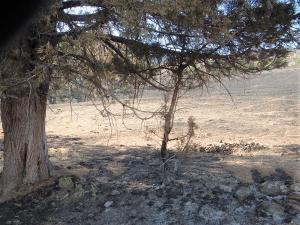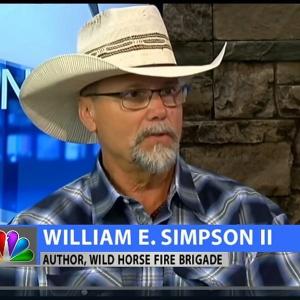HORSE CANADA Article - Can Wild Horses Help Prevent Wildfires in the West?
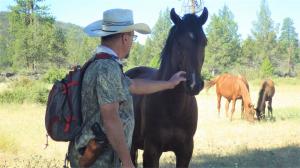
A mighty wild mountain stallion greets naturalist and horse expert William E. Simpson II. Photo: Carla Bowers
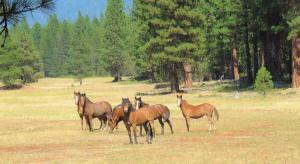
A family of native species American wild horses has symbiotically reduced grass and brush wildfire fuels, producting a natural fire-break that protects a forest.
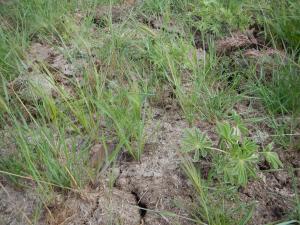
The seeds of native grasses and plants in horse droppings have germinated as part of the symbitoic relationship between wild horses and the grasses and plants that nourish the horses
HORSE CANADA interview with William E. Simpson II, examines his plan, 'Wild Horse Fire Brigade', to save wild horses by rewilding them to reduce wildfire fuels
https://horse-canada.com/magazine/equine-welfare/can-wild-horses-help-prevent-wildfires-west/
Naturalist William E. Simpson II, who lives among the free-roaming wild horses he studies in the Soda Mountain Wilderness area, conducted a 5-year study titled; 'Impact of Wild Horses On Wilderness Landscapes and Wildfire'. That 5-year study culminated with it's initial publication at the wildfire focused journal, 'GrazeLIFE'.
"One of the main topics of the GRAZELIFE-project is prevention of wildfire damage by large herbivores. While we are examining this issue in the European context, we can already take advantage of experiences in other parts of the world." https://grazelife.com/blog/wild-horse-fire-brigade-lessons-in-rebalancing-north-american-ecosystems-by-rewilding-equids/
As it happened, in July of 2018, the deadly 38,000-acre Klamathon Wildfire tested the thesis that; large native species herbivores and their symbiotic natural grazing can reduce the intensity of wildfire, via the reduction of grass and brush fuels available to wildfire; less fuel means less heat.
The area that was being naturally grazed by the local wild horses in the Soda Mountain wilderness area, where the Klamathon Wildfire was approaching was in fact more fire resistant, which helped allowfirefighters to get the blaze under containment. In fact, larger open areas that had been grazed by the wild horses provided fire fighters with safety zones for staging equipment and man-power, as well as providing fire-breaks. (SEE IMAGES)
According to a peer-reviewed published study by Oregon State University Forestry professor, William J. Ripple and a team of researchers, found that an adequate herbivory on the landscape can in fact reduce both the frequency and intensity of wildfire.
That study titled; 'Collapse of the world’s largest herbivores', states;
"By altering the quantity and distribution of fuel supplies, large herbivores can shape the frequency, intensity, and spatial distribution of fires across a landscape”. William J. Ripple, et. al.
A survey of the current collapse of native herbivores in the United States, compared to the population of large-bodied herbivores that existed 300-years ago (when native Americans could safely use prescribed burns) shows that America's population of native species large-bodied herbivores (deer, wild horses, bison, etc.) is down about 100-million animals.
Over the past five-decades, California's deer population has dropped by about 2-million deer. That's important from a wildfire fuels perspective because, each deer consumes about 7-pounds of grass and brush per day. The math tells us that the now missing 2-million deer had been mitigating about 7,000 tons of grass and brush per day! That's 2.5-million tons of wildfire fuel per year, just in California! And with Climate Change, those fuels dry sooner, and stay dry longer!
Each wild horse that is 'rewilded' (taken out of Bureau of Land Management ('BLM') holding areas, and placed into a wildfire fuels reduction role can symbiotically mitigate 30-pounds of grass and brush per day. This amounts to a wildfire fuels reduction of 5.5-tons of fuel, annually for each wild horse that is deployed. Wild horses that are 'relocated', are humanely trapped as family units from areas where they are in conflict, and then relocated into specially selected wilderness areas that are both ecologically and economically appropriate.
American has over 200-million acres of wilderness area. And of that, about 100-million acres is designated as 'critical wilderness' and must be protected from catastrophic wildfire at all costs. In such 'critical wilderness' areas, livestock production is impractical ecologically, and due to excessive costs related to logistics (no motorized vehicles allowed) and potential loss of domestic livestock to apex predators.
In these 'critical wilderness' areas, native species American wild horses can protect the heritage forests and wildlife therein via symbiotic wildfire fuels reduction. And what that means is this:
Unlike ungulates (cattle, sheep and goats) with complex stomachs that digest virtually all the seeds of native plants and grasses they eat, wild horses pass most of the seeds they consume back into the soils intact and able to germinate, along with humus and microbiome.
This reseeding of native plants and grasses is because wild horses (like all equids) have a single stomach. Through this evolved symbiotic relationship, wild horses reseed native plants and grasses, even as they consume the excessive vegetation. And this process keeps carbon compounds sequestered into the soils, instead of being volatilized into the atmosphere, adding even more greenhouse gases as is the case with prescribed burning, that poses other risks as well.
And in the foregoing rewilding and relocating of wild horses into 'critical wilderness' areas, wild horses are once again, wild and free, as 'an integral part of a natural system on public lands', which is the intention cited in the preamble of the 'Wild Free-Roaming Horses and Burros Act (WFRHBA), as established in 1971.
Moreover, wild horses are then in the presence of their co-evolved natural predators, which resumes the critical evolutionary process of 'Natural Selection', which preserves the genetic vigor of the species, while concurrently keeping populations in equilibrium within the ecosystem, as was the case for millennia.
Learn more about 'Wild Horse Fire Brigade' at: https://www.wildhorsefirebrigade.com/
About William E. Simpson II:
William E. Simpson II is a naturalist/rancher living among and studying native species American wild horses. He is the author of two published books and more than 100 published articles on subjects related to wild horses, wildlife, wildfire, and public land (forest) management. He has appeared on NBC NEWS, ABC NEWS, theDoveTV and has been a guest on numerous talk radio shows including the Lars Larson Show, the Bill Meyer Show, and on NPR Jefferson Public Radio.
William E Simpson
Wild Horse Ranch Productions
+1 858-212-5762
email us here
Fuel, Fire and Wild Horses
Legal Disclaimer:
EIN Presswire provides this news content "as is" without warranty of any kind. We do not accept any responsibility or liability for the accuracy, content, images, videos, licenses, completeness, legality, or reliability of the information contained in this article. If you have any complaints or copyright issues related to this article, kindly contact the author above.

